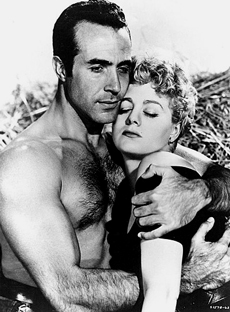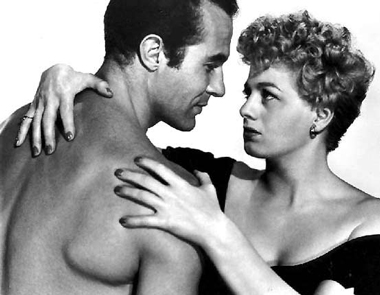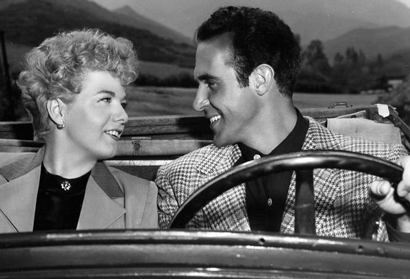
 |
|
|
|
Although Warner Bros. released an impressive streak of socially conscious films in the 1930s, Hollywood was always uneasy making what became known as "message" pictures. American audiences went to movie shows to be entertained, not preached at, a fact that hasn't changed. Writers love jokes and romance and action as much as anyone else but many of the good ones also felt that movies should say something as well. A movie about real people with a real theme can't ignore social reality, and plenty of writers voiced disdain for the generic Hollywood vision that confected a fake America and suppressed the real problems of the day. Yes, dark-themed film noirs proliferated in the late 1940s but even they were heavily toned down, with most "dangerous" ideas removed or disguised. Mainstream Hollywood sold the message was that America was a peachy-keen place, the land of opportunity where citizens that didn't live in a nice middle-class home could get there just by having a good heart and attending church. Some of the exceptions, the pictures we tend to celebrate now, were tougher-minded classics by established filmmakers that could fashion social criticism into great entertainment: George Stevens, William Wyler, Joseph Mankiewicz, Billy Wilder. Liberal, well-read producers had a tough row to hoe in the budget minded studios of the early 1950s. Ex- RKO staffer Stephen Ames had produced Joseph Losey's left-wing parable The Boy with Green Hair. Moving to MGM (presumably at the behest of MGM chief Dory Schary, late of RKO) Ames teamed with the writer John Fante, who was known mostly in literary circles as the author of Ask the Dust, a tale of an Italian-American writer trying and failing to find happiness in Southern California. The project at hand was Shameless, the story of a newly naturalized Mexican-American farm worker struggling against prejudice and bigotry. Fante would seem to have been a good choice for the project, as he had written a quadrilogy of books about an impoverished family of Italian-Americans. 
The movie ended up as My Man and I, a well-intentioned and very well acted lower-tier MGM production, one not given a special publicity push. It's a vehicle for the talented Ricardo Montalban, who had earned his ticket out of playing Latin lovers in Technicolor musicals by proving his mettle as a dramatic performer in three years' worth of noir thrillers. Montalban's earlier crime saga about migrant Mexican workers was Border Incident. The show was a definite anomaly for MGM, part of the battle between studio heads Dory Schary and Louis B. Mayer. But if you want to see what a mess the glamour factory MGM could make with a gritty story about Mexican farm workers, My Man and I is just the ticket. Collecting his pay after helping to deliver a load of vegetables to market, Mexican laborer Chu Chu Ramirez (Ricardo Montalban) refrains from blowing his money on gambling, drink and women. He instead leaves his newly purchased used Encyclopedia with his lazy friends and takes a low-paying job clearing a field for farm owner Ansel Ames (Wendell Corey). Chu Chu doesn't suspect that the indolent Ansel has no money and no intention of paying him. The plot thickens when the virtuous Chu Chu repels a come-on from Ansel's bored, bitter wife (Claire Trevor). Bright and cheerful, Chu Chu proudly carries his "welcome to citizenship" letter from the President wherever he goes. He befriends Nancy (top-billed Shelley Winters), a dissolute barfly who thinks the handsome Chu Chu is on the make. His job finished, Chu Chu returns to the city with Ansel's paycheck, which bounces. When meets Nancy again, their relationship becomes serious. After allowing Ames to stall him, Chu Chu finally takes the farmer to small claims court, where all Ansel has to do is promise to pay. But his response is to order Chu Chu off his property with a gun. Believing in the American system of justice, Chu Chu presses his case. A shooting occurs and Ansel is wounded. Chu Chu is arrested for attempted murder, and the distraught Nancy falls into a suicidal depression. How can these wrongs be righted? My Man and I cannot be faulted for performances, but William Wellman's direction is colorless and the production very much on the drab side. We see a few real locations but most of the movie is performed on standing sets or one of MGM's ranch lots. What is interesting about the movie is its careful sanitization of subject matter seen only in infrequent, so-called subversive political dramas. 1 
Chu Chu Ramirez is an almost complete fantasy, a handsome, polite, patriotic, gallant and boundlessly optimistic day laborer. He speaks out about the glories of America at every opportunity. Chu Chu controls his drinking and has no vices. In short, he's as unreal as some of the characters played by Sidney Poitier, when the best thing a black actor could do for racial relations was to put a positive image before the public. Poverty and hardship has somehow made Ramirez into a virtuous superman. Along with the other Mexican-American characters he's been given a phony pidgin-English dialect that exists only in the movies. Chu Chu buys a handsome but incongruous hat that to him represents respectability. At various points in the story he pawns the hat (and his treasured citizenship letter) to get money to help Nancy. The public discourse of the time maintained that prejudice against minorities like Mexican Americans permeates the culture, and that citizen farm workers make up a permanent sub-class denied full rights and opportunities. Wealthy employers, the media and the courts scream socialism at any attempt of these powerless workers to organize for their rights. My Man and I makes very certain that Chu Chu always stands up to injustice as an individual. Although he's beaten at every turn in his quest for respect from the verminous Ansel Ames, Chu Chu never despairs for his lot in life or loses his faith in the system. When things go wrong his friends band together, but not politically. And sure enough, right triumphs in a too-absurd-for-words resolution that sees the villains turning themselves in for theft and perjury, out of a desire to atone. By 1952, Hollywood stories requiring social justice to triumph require outright miracles. Viewers accustomed to this kind of pap will not be shocked when the Sheriff (Robert Burton) buys Chu Chu a bottle of soda pop as he personally accompanies him out of the jail to freedom. This is odd, as Chu Chu was cleared of his main crime but not of breaking jail and escaping; I can't imagine a court that would completely overlook that offense. The soda pop machine originally refused to dispense a drink, which leads us to think that My Man and I is saying that justice in American has its little problems but things always work out in the end. This philosophy contrasts mightily with the suppressed left-wing film Salt of the Earth, released two years later. The story of a mining strike by mostly Mexican-Americans shows the intense xenophobic hatred for Mexicans by the courts, the police and the public in general. The film industry made sure that the movie -- yes, produced and filmed by Hollywood leftists -- never got a release. 
Ricardo Montalban holds the show together with real star power, somehow making "Chu Chu" into a watchable character. Fresh from her Oscar nomination for A Place in the Sun Shelley Winters is yet another wounded, forlorn woman. Ms. Winters excels at coming off as shopworn goods, but the basically clean-looking surroundings keep the show several levels removed from any feeling of reality. I suppose the real Nancy, taken somewhat to an opposite extreme, would be the bawd played by Susan Tyrell in John Huston's Fat City. That movie is about an addle-brained boxer who lives among farm workers. It provides another potent contrast to My Man and I. The title comes from the lyrics of the song Stormy Weather, which pops up frequently to make us think we're looking at a story of a troubled romance. So do the film's publicity photos. The best performances in the film come from Wendell Corey and Claire Trevor, as the poisonous pair out on the farm (a weed patch). My Man and I at least gets this part right. Mr. and Mrs. Ames don't really own the land; she's desperate and he spends his time sitting around drinking beer. We believe it when she puts the moves on Chu Chu, who looks pretty appealing digging out tree stumps shirtless in the sun. The fight that breaks out in this festering household is credible as well. But the Ames' final change of heart is one of those scenes that makes one want to fall down laughing. A cynical attitude is completely unnecessary. Various Latin and ethnic actors play Chu-Chu's farm worker friends. Their dialogue does not exist outside of Hollywood movies or TV shows. One of them is played by none other than Jack Elam, the wall-eyed, very Anglo character actor who plays memorable baddies in at least two hundred westerns and cop shows. 
The Warner Archive Collection DVD-R of My Man and I is a spotless transfer of an element in perfect condition. William Mellor's cinematography has clean lines and affects nice day-for-night work out in the country. The WAC's liner blurb correctly notes the John Fante connection, but stretches the film's similarity to the book Ask the Dust a bit too far. Chu Chu's love for Nancy is a cupcake compared to the novel's miserable, self-loathing hero's effort to be good enough for a doomed, unreachable Mexican-American waitress. The movie's noble Chu Chu should stop reading his letter from the President and run for public office. Considering the miracles on view in My Man and I, they'd wave the birth requirement and elect him to the White House.
On a scale of Excellent, Good, Fair, and Poor,
My Man and I rates:
Footnotes:
1. Prime example, badly in need of a disc release: Joseph Losey's The Lawless, about a bigoted rural town where the white majority terrorize the Mexican-American minority. Most movies of this kind have poor production values or are compromised with tacked-on happy endings. This 1950 show convinces that racism is the number one enemy of American values.
Reviews on the Savant main site have additional credits information and are often updated and annotated with reader input and graphics. Also, don't forget the 2011 Savant Wish List. T'was Ever Thus.
Review Staff | About DVD Talk | Newsletter Subscribe | Join DVD Talk Forum |
| ||||||||||||||||||